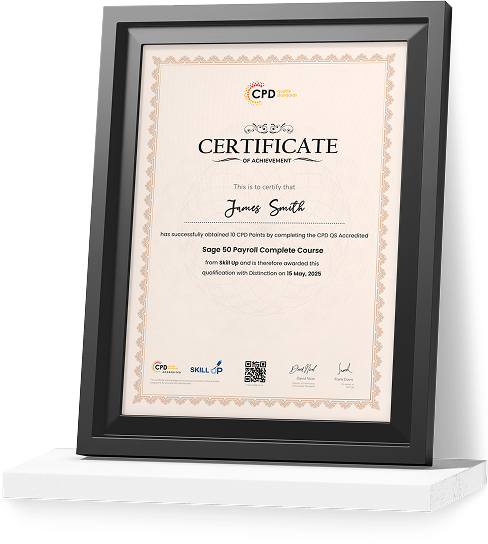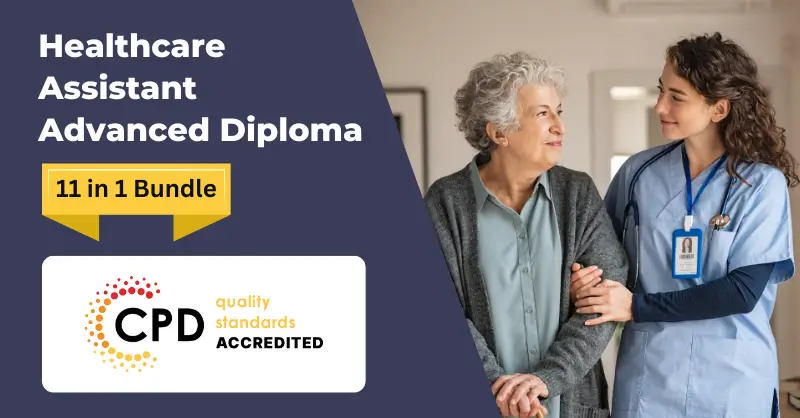 Healthcare Assistant Advanced Diploma
Healthcare Assistant Advanced Diploma
Healthcare Assistant Advanced Diploma offers a comprehensive pathway into healthcare professions in the UK. This programme covers nursing principles, effective communication, infection control, patient mobility, medication administration, data protection, and mental health awareness. Learners also explore health and social care systems, legal standards, and consent training relevant to the British context. Designed to equip individuals with in-depth knowledge of healthcare practice, this healthcare assistant advanced diploma course online builds professional competence for working in hospitals, residential care, GP surgeries, and community health services. Completing the healthcare assistant advanced diploma course London opens doors to diverse career roles across health and social care.
 Course Description
Course Description
Picture a role where every decision directly improves someone’s quality of life. The healthcare assistant advanced diploma course prepares you to step confidently into that role. From understanding patient rights to applying safe hygiene protocols, every module has been crafted to ensure you are career-ready. Unlike ordinary healthcare assistant training courses UK, this advanced programme blends theory with essential competencies, ensuring you stand out in competitive job markets.
The journey begins with foundational nursing and expands into areas such as pain management, GDPR in healthcare, consent processes, and medical administration. Learners will also explore stress management, equality in care, and the latest approaches to safeguarding patients. This makes it more than just an HCA training course—it is a professional diploma built to meet modern NHS and private sector expectations.
With modules on social care, workplace safety, electronic records, and mental health support, you are equipped to adapt across varied settings. Whether you study via the healthcare assistant advanced diploma course online or pursue the healthcare assistant advanced diploma course London, the qualification ensures you become a valued contributor to the UK healthcare system. This course also complements those looking at further health care assistant training courses for career progression.
 Learning Outcome
Learning Outcome
- Apply infection control, hygiene and medication administration techniques in healthcare settings.
- Interpret and implement GDPR regulations and legal frameworks in clinical environments.
- Demonstrate advanced communication strategies with patients, families, and colleagues.
- Provide safe, ethical, and compassionate support across multiple health and social care settings.
- Manage mental health awareness, consent, and safeguarding responsibilities within UK healthcare.
 Who Is This Course For?
Who Is This Course For?
- Individuals seeking structured healthcare assistant training courses UK for professional entry.
- Career changers aiming to qualify through an accredited HCA training course.
- Learners interested in flexible study via the healthcare assistant advanced diploma course online.
- London-based candidates looking to enhance prospects with a healthcare assistant advanced diploma course London.
- Healthcare support staff wishing to progress through recognised health care assistant training courses.
 Certificate of Achievement
Certificate of Achievement
Earn Your Accredited Certificate with Transcript
Save 20% with the coupon code SKILL20

Show Your Certified Identity with a CPD-QS Certificate
Perfect for employers, clients, or academic verification.

 Career Path
Career Path
- Healthcare Assistant (HCA) – Provide direct patient support across hospitals, care homes, and clinics. Average Salary UK: £40,000 – £45,000 per year.
- Nursing Associate – Assist registered nurses in delivering patient care, focusing on medication, hygiene, and monitoring. Average Salary UK: £42,000 – £46,000 per year.
- Medical Secretary/PA – Manage patient records, schedules, and confidential documents within healthcare environments. Average Salary UK: £41,000 – £47,000 per year.
- Health and Social Care Officer – Implement policies and safeguard vulnerable individuals in community and residential settings. Average Salary UK: £43,000 – £48,000 per year.
- Mental Health Support Worker – Provide structured interventions, support, and care plans for individuals with mental health conditions. Average Salary UK: £44,000 – £49,000 per year.
- Clinical Support Specialist – Work alongside healthcare professionals to deliver advanced support in specialised medical fields. Average Salary UK: £46,000 – £50,000 per year.
 Frequestly Asked Questions
Frequestly Asked Questions
A healthcare assistant (HCA) supports nurses, doctors, and other professionals in hospitals, care homes, and community settings across the UK. Their duties include helping patients with personal care, monitoring vital signs, maintaining hygiene, preparing meals, and ensuring comfort. With training from a healthcare assistant advanced diploma course online or a healthcare assistant advanced diploma course London, HCAs are prepared to provide safe, compassionate, and effective care.
The hourly pay for NHS healthcare assistants in the UK usually starts at £11–£13 per hour on Band 2 of the NHS Agenda for Change pay scale. With more experience or progression to Band 3, hourly rates can rise to £14–£16 per hour. Completing an HCA training course or recognised healthcare assistant training courses UK helps improve career prospects and pay.
In Scotland, healthcare assistants employed in NHS Scotland typically earn between £21,000 and £28,000 per year, depending on experience and role. This equates to an average hourly wage of £11–£14. Studying a health care assistant training course ensures candidates are fully prepared for these positions across Scottish hospitals and community health services.
No, a healthcare assistant is not exactly the same as a carer. Carers often support individuals in their own homes or residential facilities, while HCAs work directly in hospitals, GP surgeries, and clinical environments. By completing a healthcare assistant advanced diploma course, individuals are trained for clinical procedures, infection control, and patient monitoring, which go beyond typical carer responsibilities.
To become a healthcare assistant in the UK, no formal degree is required, but employers expect GCSEs (or equivalent) in English and Maths, plus healthcare-related training. Completing a healthcare assistant advanced diploma course online or enrolling in healthcare assistant training courses UK gives candidates the knowledge and credibility to secure NHS or private healthcare positions.
The lowest paid jobs in the NHS fall under Band 1 and Band 2 roles, such as domestic assistants or entry-level support staff. However, most new healthcare assistants now start at Band 2, with salaries around £21,000 per year. Progression through additional health care assistant training courses can quickly improve pay and responsibilities.
Yes, with additional training, healthcare assistants can perform venepuncture (taking blood samples). Many NHS Trusts provide in-house training, but completing an HCA training course or a healthcare assistant advanced diploma course London often includes preparation for this responsibility. This enhances employability and allows HCAs to support clinical teams more effectively.
Healthcare assistants cannot perform duties reserved for registered nurses or doctors. They cannot prescribe medication, create care plans, administer controlled drugs, or carry out complex clinical assessments. The healthcare assistant advanced diploma course equips learners with skills for patient support, but it does not qualify them to act as registered nurses.
No, a healthcare assistant is not classed as a nurse in the UK. Nurses require a university degree and NMC (Nursing and Midwifery Council) registration. HCAs, however, play a vital support role in nursing teams. By completing recognised healthcare assistant training courses UK, learners can build strong foundations and later progress into nursing studies if desired.
Curriculum
-
Introduction to Healthcare Assistant
00:17:00
-
Working in Different Healthcare Settings
00:15:00
-
Legal, Standards and Professional Aspects of Ethical Practice: Part – 1
00:52:00
-
Legal, Standards and Professional Aspects of Ethical Practice: Part – 2
00:50:00
-
Effective Communication
00:47:00
-
Health and Safety
00:47:00
-
Hygiene
00:30:00
-
Infection Control
01:00:00
-
Asepsis
00:16:00
-
Medication Administration
00:18:00
-
Understanding Immune System
00:28:00
-
Rest and Sleep Management
00:19:00
-
Mobility and Immobility Issues of Patients
00:17:00
-
Pain Management
00:25:00
-
Nutrition
00:24:00
-
Fluid and Electrolyte Balance
00:23:00
-
Assisting with Elimination
00:29:00
-
Oxygenation
00:30:00
-
Introduction to GDPR
00:24:00
-
GDPR and Healthcare Setting
00:18:00
-
General Data Protection Regulations Explained
00:14:00
-
Lawful Basis for Preparation
00:26:00
-
Responsibilities and Obligations
00:28:00
-
Electronic Medical Records
00:18:00
-
Rights and Breaches
00:22:00
-
Module 8: Human Body Vocabulary with Pictures
00:48:00
-
Equipment, Instruments and Lab Tests
00:20:00
-
Acronyms and Abbreviation
00:37:00
-
Digestive System
00:26:00
-
Cardiovascular System
00:21:00
-
Blood and Immunity System
00:16:00
-
Respiratory System
00:18:00
-
Musculoskeletal System
00:18:00
-
Central Nervous System
00:15:00
-
Professional Communication and Behaviour
00:20:00
-
Interviewing Techniques
00:33:00
-
Adapting Communication to a Patient’s Ability to Understand
00:20:00
-
Introduction to COVID-19
00:29:00
-
Preventions and social measures to be taken
00:29:00
-
Understanding of Covid-19 as a Pandemic and How It Is Related to Zoonotic Diseas
00:13:00
-
The Strike of Pandemic Around the World and Great Britain
00:13:00
-
Effects of Covid-19 on Human Life
00:20:00
-
AI, Data Science and Technological Solutions Against COVID-19
00:20:00
-
Diagnosis and Treatment
00:13:00
-
Introduction to Advanced Health and Social Care
00:24:00
-
Introduction to the UK Health System
00:29:00
-
Essential Principles, Policies and Legislations in Health and Social Care Work
00:42:00
-
Fundamental Aspects of Providing Quality Health & Social Care
00:20:00
-
Introduction to COVID-19
00:28:00
-
Understanding of Covid-19 as a Pandemic and How It Is Related to Zoonotic Diseas
00:12:00
-
The Strike of Pandemic Around the World and Great Britain
00:12:00
-
Effects of Covid-19 on Human Life
00:20:00
-
Diagnosis and Treatment
00:12:00
-
Preventions and social measures to be taken
00:28:00
-
AI, Data Science and Technological Solutions Against COVID-19
00:20:00
-
An Introduction to Consent
00:12:00
-
Information Regarding Consent
00:11:00
-
Consenting for Someone Else
00:15:00
-
Best Interest Decision Making
00:20:00
-
Assessing Capacity
00:13:00
-
Providing Care or Treatment to People Who Lack Capacity
00:12:00
-
Public Bodies and Services Created by MCA Act 2005
00:09:00
-
UK Acts in Relation to Consent
00:25:00
-
Handling Complaints Regarding Consent
00:20:00
-
Maintaining Medical Records
00:20:00
-
Effective Filing Systems in Medical Offices
00:17:00
-
Confidentiality in a Medical Environment
00:15:00
-
Controlling Stocks and Supplies
00:10:00
-
Medical Jargon and Terminology
00:26:00
-
Maintaining Workplace Safety
00:21:00
-
Information Technology in Health Care
00:15:00
-
Legal aspects and Ethics
00:20:00
-
Introduction to Medical Secretary
00:16:00
-
Organise Schedules
00:21:00
-
Maintaining Medical Records
00:19:00
-
Effective Filing Systems in Medical Offices
00:16:00
-
Confidentiality in a Medical Environment
00:14:00
-
Controlling Stocks and Supplies
00:10:00
-
Medical Jargon and Terminology
00:25:00
-
Maintaining Workplace Safety
00:19:00
-
Information Technology in Health Care
00:16:00
-
Legal aspects and Ethics
00:19:00
-
Introduction to Mental Health
00:19:00
-
Understanding Mental Health
00:18:00
-
Mental Health and Work
00:21:00
-
Mental Health in the Workplace
00:22:00
-
Mental Illness in the UK Workforce
00:13:00
-
The Challenges of Modern Workplace
00:23:00
-
Common Cause of Mental Illness
00:26:00
-
Stress at Work
00:47:00
-
Mood Disorders
00:21:00
-
Promoting Good Mental Health
00:22:00
-
Recommendation for Work at Home
00:22:00
-
Responding to Emotionally Distressed Employees
00:15:00
-
Safeguarding Mental Health During Coronavirus (COVID-19) Outbreak
00:12:00
-
Introduction to Health and Social Care
00:18:00
-
Communication and its Relevance
00:50:00
-
Rights and Responsibilities as a Health and Social Care Worker
00:41:00
-
Role as a Caregiver and Healthcare Professional
00:25:00
-
Working in Health and Social Care; Promoting Equality, Diversity and Rights
00:48:00
-
Important Principles and Policies in Health and Social Care Work
00:22:00
-
Understanding legal, professional standards of practice and ethical aspects of health care- Part 1
00:51:00
-
Understanding legal, professional standards of practice and ethical aspects of health care- Part 2
00:49:00
-
Safeguarding Vulnerable Individuals
00:51:00
-
Health and Safety Responsibilities
00:53:00
-
Risk Management in Health and Social Care
00:32:00
-
Get Your CPD Certificate
00:01:00
Offer Ends in

-
Duration:Self-paced Learning
-
Access:1 Year



.png) 48 Reviews
48 Reviews 2246 Students
2246 Students



